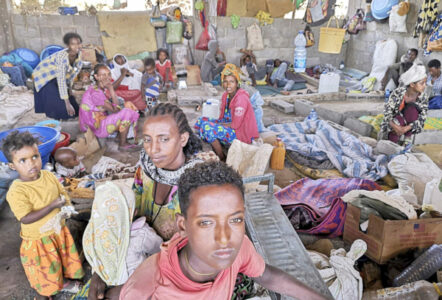
Nine New Zealand aid agencies, including one headed by a Pakuranga man, are urging Kiwis to act now to provide life-saving support for people affected by the hunger crisis in East Africa.
The world is currently facing one of the worst hunger and malnutrition crises in human history, with escalating conflict and an increase in extreme weather events due to climate change driving a massive food emergency.
About 50 million people in 45 countries are threatened by severe hunger.
Tearfund New Zealand’s international programmes director Tim Manson, from Pakuranga, says this hunger crisis is affecting countries across the globe, but low-income, drought affected countries in East Africa are the hardest hit.
“We are all feeling the pinch of rising food costs, but for families, especially children in countries like Ethiopia, it’s a life-or-death situation. Food price increases can have devastating effects for the world’s most vulnerable,” Manson says.
According to the UN, without immediate food and care, almost 8 million East African children under five are at risk of death from malnutrition, with that number rising daily.
Manson says this crisis will sharply escalate. “Some parts of East Africa have had four failed rainy seasons in a row. This has meant farmers are no longer able to support themselves and many have left their homes to look for food and work.”
UNICEF Aotearoa’s CEO Michelle Sharp says one of the biggest drivers of this food crisis is the ongoing conflict in Ukraine, which is having a massive impact on global food supplies, including in East Africa.
“Coupled with a severe drought, it’s a recipe for disaster. Water sources have dried up, crops can no longer grow in the parched earth and livestock are dying. Families have no income or way to feed themselves. Millions of children’s lives are at risk,” says Sharp.
Save the Children chief executive Heidi Coetzee says in food crises like these, children are always the most vulnerable. In 2011, the last time famine hit Somalia, 260,000 people died–more than half of those lives lost were children.
“Not only are children’s lives at grave risk in this crisis, but so are their futures. Extreme food shortages are pushing families to take desperate measures, threatening children’s wellbeing, safety, and futures. Pulling children out of school to work, early marriage and even selling them are some of the tragic lengths that families go to, just to feed their children.”
Tearfund New Zealand, UNICEF Aotearoa, Save the Children, CBM, Orphans Aid International, Hagar, International Needs, Oxfam and Christian World Service are delivering emergency food to thousands of families.
But the need continues to grow, and the organisations say they urgently need to scale-up their response.
“Every donation counts and will be used to save people from starvation. Your support can make a crucial difference. We encourage you to give what you can,” Manson says.










